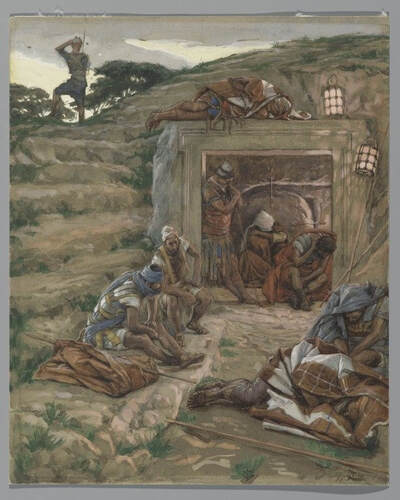 After Christ’s death, if Joseph of Arimathea and Nicodemus, both Sanhedrin members, had not come out of the shadows as secret Jesus followers, his body probably would not have been properly buried. After these things Joseph of Arimathea, who was a disciple of Jesus, but secretly for fear of the Jews, asked Pilate that he might take away the body of Jesus, and Pilate gave him permission. So he came and took away his body. Nicodemus also, who earlier had come to Jesus by night, came bringing a mixture of myrrh and aloes, about seventy-five pounds in weight. So they took the body of Jesus and bound it in linen cloths with the spices, as is the burial custom of the Jews. Now in the place where he was crucified there was a garden, and in the garden a new tomb in which no one had yet been laid. So because of the Jewish day of Preparation, since the tomb was close at hand, they laid Jesus there (John 19:38-42, ESV). By removing Jesus’ dead body from the cross, these religious men became unclean, rendering them unworthy to eat the Passover. Passover was an essential part of a devoted Jewish life. This one-act showed where they now placed their faith. They had found the Lamb of God! On Saturday, we see the difference between Joseph of Arimathea and Nicodemus compared to the unbelieving religious leaders. The Jewish leaders went to Pilate and asked that a guard seal the tomb. Unlike the disciples, Jesus’ enemies remembered that he promised to rise on the third day! The next day, that is, after the day of Preparation, the chief priests and the Pharisees gathered before Pilate and said, “Sir, we remember how that impostor said, while he was still alive, ‘After three days I will rise.’ Therefore order the tomb to be made secure until the third day, lest his disciples go and steal him away and tell the people, ‘He has risen from the dead,’ and the last fraud will be worse than the first.” Pilate said to them, “You have a guard of soldiers. Go, make it as secure as you can.” So they went and made the tomb secure by sealing the stone and setting a guard (Matthew 27:62–66, ESV). Pilate gave the leaders what they wanted. A guard placed the official Roman seal on the stone closing the entrance to the tomb. Nobody could break into the tomb to steal the body. God used the Jewish leaders and the Roman guard to help establish the legitimacy of Christ’s resurrection from the dead. Even though his enemies tried to keep the Messiah down, he arose victoriously.
1 Comment
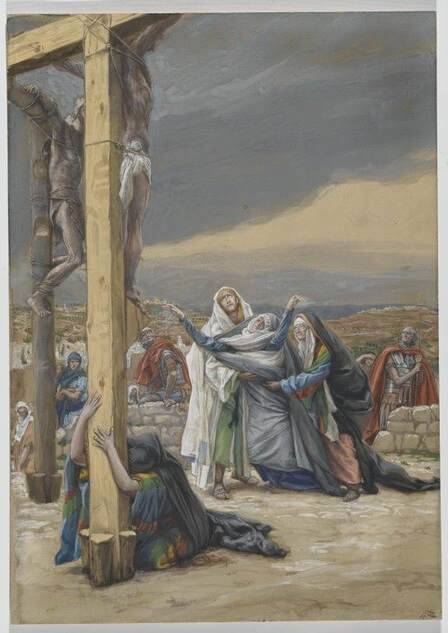 Good Friday, the day the sinless savior, the Lord Jesus Christ, died as our substitute so that we might find atonement—the forgiveness of sins. The day itself was not good, nor was it good that Christ had to suffer and die on a cross. What makes Good Friday good is that God in Christ purchased our salvation. That is infinitely good! On the cross, God judged the sins of all humanity, past, present, and future. Yes, even future sin. In fact, when Christ died on the cross, all of our sins were still in the future. He paid the penalty for our sins even before we committed the them. God set up a system of animal sacrifices in the Old Testament to provide a way of dealing with sin. Despite all the sacrifices and attempts to handle sins, they were all insufficient. John the Baptist made it clear that sin could be forgiven only in Christ. “The next day he saw Jesus coming toward him, and said, ‘Behold, the Lamb of God, who takes away the sin of the world!’” (John 1:29, ESV). The perfect Christ was the only qualified sacrifice to bring full and lasting forgiveness for sin. “For our sake he made him to be sin who knew no sin, so that in him we might become the righteousness of God” (2 Corinthians 5:21, ESV). Jesus became our substitute on the cross, bearing our sins’ guilt, shame, and penalty to set us free. On the cross, Jesus defeated Satan. Jesus announced before the day of his crucifixion, “Now is the judgment of this world; now will the ruler of this world be cast out” (John 12:31, ESV). How many times do you hear the condemning voice of Satan in your ears? If you know Jesus as your Lord and Savior, those are just empty words—lies that the devil hopes you will believe. “And you, who were dead in your trespasses and the uncircumcision of your flesh, God made alive together with him, having forgiven us all our trespasses, by canceling the record of debt that stood against us with its legal demands. This he set aside, nailing it to the cross. He disarmed the rulers and authorities and put them to open shame, by triumphing over them in him” (Colossians 2:13-15, ESV). Do you get it? Though Satan tries to bring up your past sins, in Christ, your entire debt was paid on Good Friday. Jesus dying on the cross settled everything, and Satan has no charges to bring against you anymore! Knowing what Christ did on that first Good Friday should move all believers to great devotion to our savior. May we sing today the heartfelt words of Isaac Watts’ hymn. Alas! and did my Saviour bleed, And did my Sovereign die! Would he devote that sacred head For such a worm as I! Was it for crimes that I had done He groaned upon the tree! Amazing pity! grace unknown! And love beyond degree! Well might the sun in darkness hide, And shut his glories in, When Christ, the mighty Maker, died For man the creature’s sin. Thus might I hide my blushing face While his dear cross appears; Dissolve my heart in thankfulness, And melt mine eyes in tears. But drops of grief can ne'er repay The debt of love I owe; Here, Lord, I give myself away, 'Tis all that I can do. 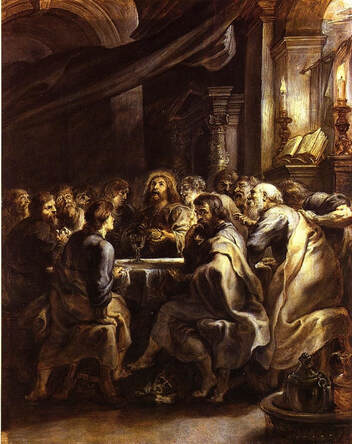 No Passover like it had been kept in Israel since the days of Samuel the prophet. None of the kings of Israel had kept such a Passover as was kept by Josiah, and the priests and the Levites, and all Judah and Israel who were present, and the inhabitants of Jerusalem” (2 Chronicles 35:18, ESV). Ideally, worshippers celebrated Passover in Jerusalem. During his reign, King Josiah set this gold standard for observing the Passover. Jesus kept the high standard for Passover as he and his disciples went into Jerusalem for this solemn occasion. Peter and John go to find the exact place where Jesus wanted to celebrate Passover. Finding the site would be challenging since they were one group among thousands looking for a place in Jerusalem to hold the meal, but Jesus sovereignly appointed the location. The Passover was a series of “scenes” unfolding during the meal. During the fifth of the seven meal scenes found in Luke’s gospel, 5:29-32; 7:36-50; 9:12-17; 10:38-42; 11:37-54; 14:1-24; 24:28-32; 24:36-42), Jesus instructed his followers how the observe communion. He clarifies that his death means more than the end of his life and ministry. Jesus takes the bread that was part of the third course of the meal and makes a new symbol out of it in light of his death. “This is my body, which is for you. Do this in remembrance of me” (1 Corinthians 11:24, ESV). The bread symbolizes the broken body of Jesus, and it would be broken over the coming hours. Jesus took the cup and said it represented “the new covenant in my blood” (Luke 22:20, ESV). The shed blood of Jesus would be the coming sacrifice on the cross, which inaugurated the covenantal provision. Throughout the New Testament, the new covenant is a central theme (Matt. 26:28; 2 Cor. 3-4; Heb. 8-10) which promises forgiveness of sins and the enabling power of the Holy Spirit. The new covenant opened a new era of God’s blessing. On April 24, we have the honor of celebrating communion at Blainsport. We remember the broken body and the shed blood of Christ on our behalf. Just as the Passover observance caused the people of Israel to look back at the Exodus, communion brings the church together to recall our identity in Christ by remembering Christ’s sacrifice on the cross. We get to reaffirm what God has done for us. On Friday, Jesus embodied the symbolism of Thursday’s Passover meal and the symbols of the Lord’s Table. Thank God for Jesus! 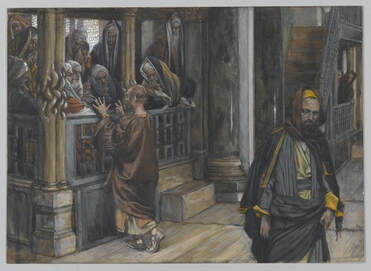 Typically called “Silent Wednesday,” biblical scholars suggest that Jesus and his disciples rested in Bethany. Sunday, Monday, and Tuesday were jam-packed days for Jesus and his disciples; Thursday and Friday would be some of the most emotionally taxing days of the entire week. By God’s grace, they had a day of respite. On this day, Judas most likely made the arrangements with the religious leaders to betray Jesus. “Then one of the twelve, whose name was Judas Iscariot, went to the chief priests and said, ‘What will you give me if I deliver him over to you?’ And they paid him thirty pieces of silver. And from that moment he sought an opportunity to betray him” (Matthew 26:14–16, ESV). Back in the 1980s, Christian youth were listening to the contemporary band Petra. They devoted one song to the betrayal of Jesus by Judas. I wonder how it makes you feel when the prodigal won’t come home I wonder how it makes you feel when he’d rather be on his own I wonder what it’s like for you when a lamb has gone astray I wonder what it’s like for you when your children disobey I wonder how it makes you feel when no one seeks your face I wonder how it makes you feel when they give up in the race I wonder what it’s like for you when they willingly disobey I wonder what it’s like for you when they willingly walk away It must be like another thorn struck in your brow It must be like another close friend’s broken vow It must be like another nail right through your wrist It must be just like Just like Judas’ kiss The song’s point is that we can look at Judas’ betrayal of Jesus and say, “How could anyone do such a thing?” and miss the fact that we make choices that betray our relationship with Jesus. Perhaps today, we need to stay close to Christ and rest in him instead of running off into the night, turning to the things that offend him. Think about it on this “Silent Wednesday.” 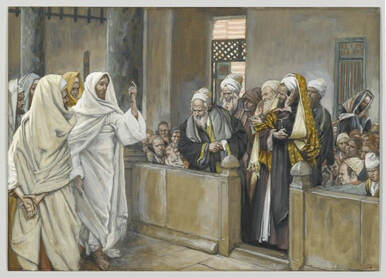 As we consider the events in Jesus’ life on Tuesday before his death, we notice a very busy day. Jesus returns to Jerusalem, passing by and cursing an unfruitful fig tree on the way. He teaches the people with parables and is again confronted by the religious leaders. The Pharisees keep asking him questions, hoping he will stumble and fail in his answers. Finally, Jesus had enough, so he lashed out with strong words of rebuke for the “scribes and the Pharisees in Matthew 23:1-39.” Imagine the religious leaders receiving a much-deserved chastisement from Jesus. “But woe to you, scribes and Pharisees, hypocrites! For you shut the kingdom of heaven in people’s faces. For you neither enter yourselves nor allow those who would enter to go in” (Matthew 23:13, ESV). Jesus persists for a total of seven woes to these religious leaders. Again and again, the leaders feel such shame and fury that they want to arrest him, but they can’t find the right time or place. Nonetheless, Jesus knew they would find a way to capture him and kill him. With the cross looming before him, Jesus said, “Now is my soul troubled. And what shall I say? ‘Father, save me from this hour?’ But for this purpose I have come to this hour. Father, glorify your name” (John 12:27–28a, ESV). Jesus didn’t speak of his imminent painful death on the cross; instead, he spoke of God receiving the glory. Talk about complete devotion and surrender to the Father’s will! The work that Jesus needed to accomplish did not come easy. How often would we prefer the easy path and settle for meager results? How many times do we think our plans are better than God’s because they require less of us than God does? Jesus committed himself to the entire purpose the Father planned for him. Then Jesus says some of the most sobering words that he spoke while on earth, “Now is the judgment of this world; now will the ruler of this world be cast out. And I, when I am lifted up from the earth, will draw all people to myself” (John 12:31–32, ESV). Jesus made known that His substitutionary death would strike the fateful blow to evil. The end of evil can be a present reality for anyone who places their belief in Jesus. At the close of such a long and tiring day filled with confrontations, teachings, and warnings, Jesus and his disciples returned to Bethany for the night. 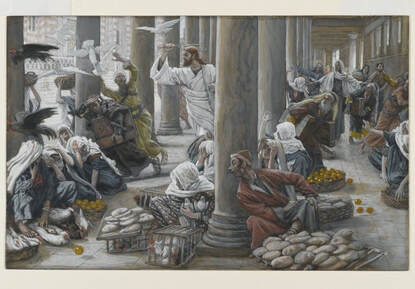 Yesterday, we embarked on the road Jesus walked to the cross, starting on Palm Sunday and climaxing at the empty tomb. Wikipedia explains that the custom of observing Holy Week began in the latter half of the 3rd century. So, during this next week, we want to join in this long Christian practice of following in the footsteps of Jesus as he completes his life on earth, dwelling with humanity. Let’s look at what happened on Monday following that first Palm Sunday. And Jesus entered the temple and drove out all who sold and bought in the temple, and he overturned the tables of the money-changers and the seats of those who sold pigeons. He said to them, “It is written, ‘My house shall be called a house of prayer,’ but you make it a den of robbers.” And the blind and the lame came to him in the temple, and he healed them. But when the chief priests and the scribes saw the wonderful things that he did, and the children crying out in the temple, “Hosanna to the Son of David!” they were indignant, and they said to him, “Do you hear what these are saying?” And Jesus said to them, “Yes; have you never read, “ ‘Out of the mouth of infants and nursing babies you have prepared praise’?” And leaving them, he went out of the city to Bethany and lodged there (Matthew 21:12–17, ESV). Malachi 3:1-4 speaks of God’s Messenger recovering the true worship of God’s people. “Behold, I send my messenger, and he will prepare the way before me. And the Lord whom you seek will suddenly come to his temple; and the messenger of the covenant in whom you delight, behold, he is coming, says the Lord of hosts. But who can endure the day of his coming, and who can stand when he appears? For he is like a refiner’s fire and like fullers’ soap. He will sit as a refiner and purifier of silver, and he will purify the sons of Levi and refine them like gold and silver, and they will bring offerings in righteousness to the Lord. Then the offering of Judah and Jerusalem will be pleasing to the Lord as in the days of old and as in former years” (Malachi 3:1–4, ESV). As Jesus walks into the temple, in the court of the Gentiles, he immediately sees the money changers and pigeon pedlers. The place for the people of all the nations to worship God, the religious leaders transformed into a business center. So Jesus drove them all out, overturning their tables (Matt 21:12). He proclaims from Isaiah 56:7 that “It is written, ‘My house shall be called a house of prayer,’ but you make it a den of robbers.” In this entire scene, we see the righteous anger of Jesus. When was the last time you took such a stand against evil and injustice? We probably don’t need to flip tables or crack a whip, yet there are times when we need to call sin exactly what it is—an abomination to God. What’s worse, the religious leaders condone this terrible behavior. It appears that nothing angered Jesus more than the horrendous misleading of those who should know better. It makes me think about how I lead in the church and how I represent Christ as a believer. If you are a follower of Christ, you cannot turn a blind eye toward or, even worse, approve sinful acts and attitudes. On this Monday, Jesus offers hope to those who want a relationship with God but find denied opportunities by other people. In this single act in the temple court, Jesus is announcing to the nations, “Come to me”! Today, Jesus is still offering that invitation to you and me. Let’s watch how this invitation continues to unfold throughout Holy Week. |
Eric MarshallBorn in Reading, Pennsylvania, Eric grew up in the little town of Gibraltar, PA with his grandparents. He met his wife Cheryl while working at Good’s Greenhouse in Bowmansville, PA. He has three adult children and values watching them grow into the people God wants them to be. Archives
August 2023
Categories |

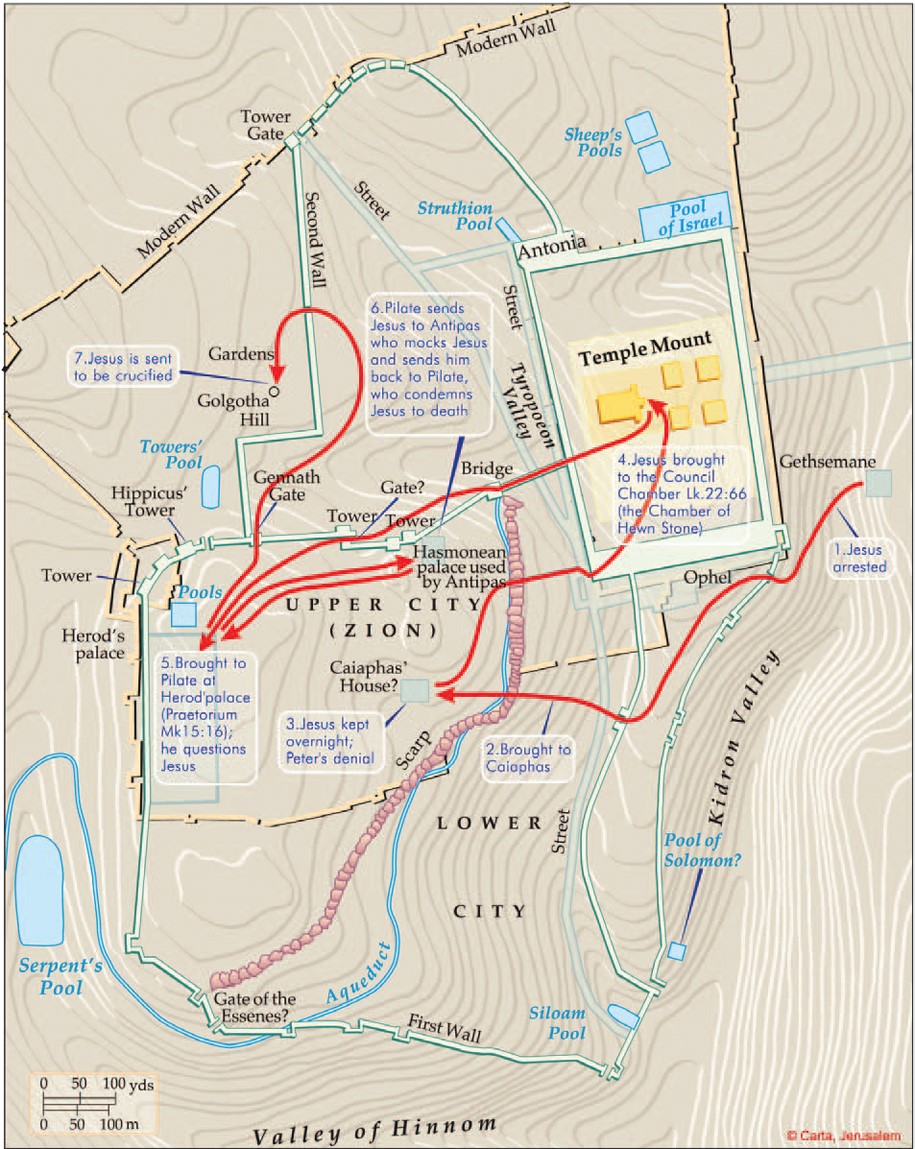

 RSS Feed
RSS Feed